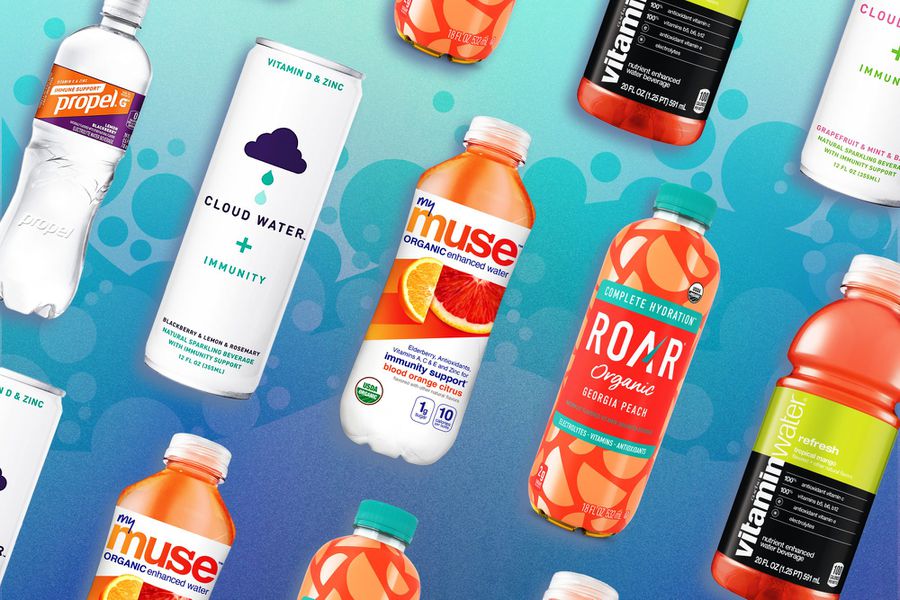We independently research, test, review, and recommend the best
products—learn more about
our process. If you buy something through our links, we may earn a commission.

Considering the widespread love for HIIT workouts, Instant Pots, and do-it-all skin-care products, it seems fair to say that most folks are obsessed with living their lives as efficiently as possible. So when you’re hydrating, why not get two — the need to hit your fluid intake and the desire to score some nutrients — for the price of one?
Enter: Vitamin-enhanced drinks, which — just as their name implies — are beverages that have been mixed with refreshing flavors and powders containing vitamins (e.g. vitamins A, B, C, D, and E), and in some cases, minerals (e.g. magnesium or zinc), says Abby Chan, M.S., R.D.N., a registered dietitian nutritionist and the co-owner of EVOLVE Flagstaff in Arizona. “What’s typically in them is a pretty small amount of actual vitamins…[so] you’re not going to overdose yourself with vitamins, especially because all of these are typically water-soluble,” says Chan. “If your body doesn’t need them, you’ll generally just end up peeing them out.”
More specifically, water-soluble vitamins (e.g. vitamins C and B), don’t build up in the cells and excess amounts can be excreted, while fat-soluble vitamins (e.g. vitamins A, D, E, and K) are stored in cells, don’t pass through the body as easily, and have the potential to cause harm when consumed in excess, according to University of Michigan Health. But you don’t have to worry about “overdosing” on those fat-soluble nutrients: Research on supplements shows you’d need to consume more than four times the recommended dietary allowance for vitamin A and more than three times that of vitamin D to potentially experience “toxic” side effects.
In general, sipping on vitamin drinks can help you stay hydrated throughout the day (women typically need to consume about 11.5 cups of fluid daily, according to the Mayo Clinic), and they don’t come with any major health risks, says Chan. However, you may not experience a drink’s supposed benefits unless you’re deficient in the particular nutrient, she says. For example, some beverages infused with B vitamins — which help the body turn the food you eat into energy — are labeled as “energy-boosting” drinks, but you probably won’t get a pick-me-up from that kind of vitamin water unless you’re low on the vitamin, she explains.
More significantly, Chan says vitamin-enhanced drinks generally contain a high amount of added sugar, which can contribute to health problems such as type 2 diabetes and heart disease when consumed in excess, according to the Centers for Disease Control and Prevention (CDC). A bottle of vitaminwater’s energy beverage, for instance, contains 27 grams of added sugar, accounting for 54 percent of the recommended daily allowance established by the U.S. Department of Agriculture (USDA). “Sugar isn’t inherently bad by any means — there’s definitely a time and a place for it,” says Chan. “But…if this is your main source of taking in vitamins, it’s going to be much better done through food, which is going to have a higher content of these vitamins as well as other nutrients, such as phytonutrients, antioxidants…protein, carbs, and all that” — without all the added cane sugar.
Some brands opt to blend their vitamin-enhanced drinks with sugar alcohols and artificial sweeteners, such as erythritol and Stevia, which don't impact blood sugar, says Chan. Still, some of these alternatives have been linked with gastrointestinal distress and discomfort, especially when consumed in large amounts. "They are also generally exponentially sweeter than typical sugar," she adds. "So that could maybe change your palate preferences so that when you are actually eating and consuming real sugar, you may want that same bang for your buck — that super, super sweetness." This could, in theory, lead to consuming more sugar to get the same result. (
If Mindy Kaling is a fan of Propel’s vitamin drinks, you know they’re worth adding to your fridge. The Lemon Blackberry- and Orange Raspberry-flavored beverages both contain 144 percent of the RDA for vitamin C, 20 percent of the RDA for vitamin E, 92 percent of the RDA for vitamin B6, and a few other nutrients. Though sugar substitutes aren’t listed on its nutrition facts label, the vitamin-enhanced drinks are sweetened with Acesulfame Potassium (aka Ace-K) and sucralose (aka Splenda) — non-nutritive sweeteners (read: calorie-free) that are 200 and 600 times sweeter than table sugar, respectively, according to the Food and Drug Administration. Translation: It’s sure to satisfy your sweet tooth. (These infused water ideas will help you stay hydrated without the sweeteners.)



































